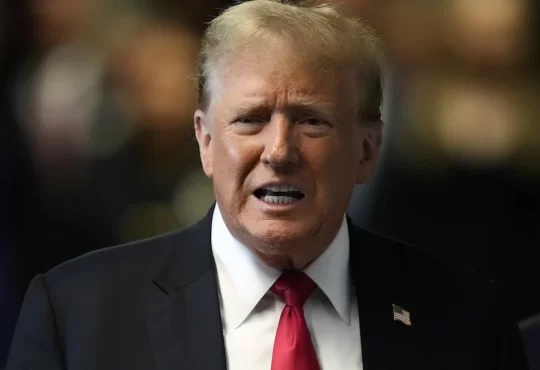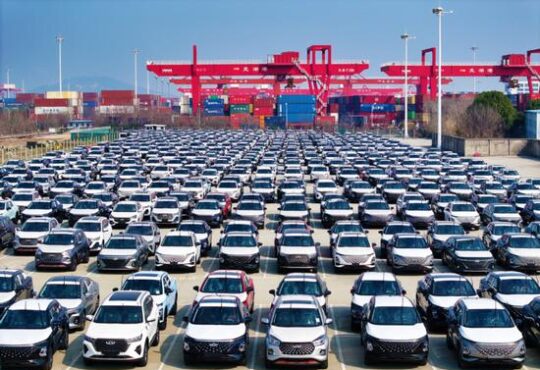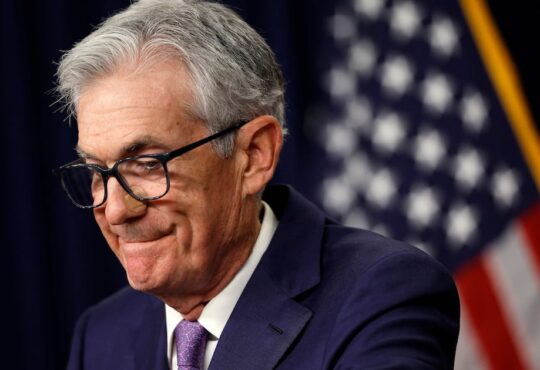
WASHINGTON — There’s been no shortage of tough news for China’s economy as some of the world’s biggest brands consider or take action to shift manufacturing to friendlier shores at a time of unease about security controls, protectionism and wobbly relations between Beijing and Washington.
Count Adidas, Apple and Samsung among those looking elsewhere.
But as a tumultuous 2023 for the Chinese economy comes to a close, there has been at least one bright spot for Beijing when it comes to foreign investment: American fast-food chains have decided a market of 1.4 billion people is simply too delicious to pass up.
Shoppers walk by a Starbucks cafe Dec. 23 at an outdoor shopping mall in Beijing. Starbucks has invested $220 million in a manufacturing and distribution facility in eastern China, its biggest project outside the U.S.
KFC China’s parent company opened its 10,000th restaurant in China in December and aims to have stores within reach of half of China’s population by 2026. McDonald’s is planning to open 3,500 new stores in China over the next four years. And Starbucks invested $220 million in a manufacturing and distribution facility in eastern China, its biggest project outside the U.S.
People are also reading…
This is surely not what Chinese President Xi Jinping had in mind as he made the case to American CEOs about the upside of China’s “super-large market” last month while he was in San Francisco for a summit of world leaders. The investments in fast food and other consumer goods, while Washington is curbing exports of computer chips and other advanced technology, don’t fit into China’s own blueprint for modernizing its economy.
“As you try to interpret the signals from McDonald’s and Starbucks” and other chains, says Phil Levy, chief economist at the supply chain management firm Flexport, “note what the industries are: These are not high-tech burgers.’’
And while some U.S. companies are increasing investments in the world’s second-largest economy, overall foreign investment began falling this year. In the July-September quarter, net foreign direct investment in China sank to a deficit of $11.8 billion, the first quarterly deficit since Beijing began publishing the data in 1998.
People visit KFC’s newly opened 10,000th outlet in China, on Dec. 17 in Hangzhou in east China’s Zhejiang province. Amid a tumultuous 2023 for the Chinese economy, some American fast food companies have announced a surge of investment in the market of 1.4 billion people.
As tensions simmer between China and its Western trading partners, many multinational companies are shifting investments to other places, such as Southeast Asia or India, or repatriating their earnings. That has sapped China of a key engine when its economy has yet to fully recover from the disruptions of the pandemic and a property industry crisis that has been a drag on growth.
Beijing puts some of the blame on U.S. government policies.
Commerce Ministry spokesperson Shu Jueting said recently, “The U.S. side has repeatedly politicized economic, trade and technology issues and overstretched the concept of security, abused export control measures, and restricted trade and investment in China by its own enterprises, which is forcing enterprises to give up opportunities in the Chinese market and opportunities for win-win cooperation.”
A survey released in September by the U.S.-China Business Council, which represents American companies in China, suggested that the uncertainty has taken a toll: 43% of its members said China’s business environment had deteriorated in the past year, and 83% said they were less optimistic about China than they had been three years ago. Twenty-one percent said they were investing fewer resources in China, versus just 10% who were investing more.
Surveys of European and Japanese companies have shown similar results.
A man carries McDonald’s takeout Dec. 24 at a newly opened McDonald’s restaurant in China. McDonald’s, KFC and Starbucks are among companies in recent months that have announced plans for major investment in China.
While China’s market is gigantic, it’s ailing. Unemployment among young Chinese rose to over 20% by June, the last time the government released that data. Housing prices are falling and the stock market is down nearly 15% since the summer. That’s left many Chinese feeling nervous about spending.
Still, bullishness for China as other industries try to de-risk and detangle from Beijing may be a profit-increasing strategy for the fast-food industry.
“We believe there is no better time to simplify our structure, given the tremendous opportunity to capture increased demand and further benefit from our fastest-growing market’s long-term potential,” McDonald’s CEO Chris Kempczinski said as the Chicago-based company announced in November it was increasing its minority 20% ownership of its McDonald’s licensed stores in China, Macau and Hong Kong to 48%.
Burgers and lattes don’t raise the sorts of friction that more high-tech industries have in the complicated U.S.-China relationship. Those strains have persisted under the presidency of Joe Biden, who took office vowing to do more to counter China’s expanding military clout and its menacing of neighbors, to improve the country’s treatment of Uyghur and other ethnic minorities, and to crack down on intellectual property theft.
People visit at Apple Store on Dec. 23 in Beijing. Apple is among companies looking elsewhere to invest.
Relations hit a low point in February when Biden ordered a Chinese spy balloon that traversed the continental United States to be shot down. Beijing, which claims self-governed Taiwan as its own territory, also protested a stopover in the U.S. by the island’s president, Tsai Ing-wen, earlier this year. China answered fresh U.S. controls on exports of advanced computer chips and the technology to make them with limits of its own on exports of vital commodities like graphite, gallium and germanium, all metals used in making semiconductors, solar panels, missiles and radar.
The relationship appears to be stabilizing somewhat as 2023 winds down, highlighted by last month’s Biden and Xi meeting outside San Francisco. But since then, Biden’s top advisers have said there are no plans to shift the strategy of tightening regulations and blocking U.S.-based high-tech investments in China, citing the need to safeguard national security.






